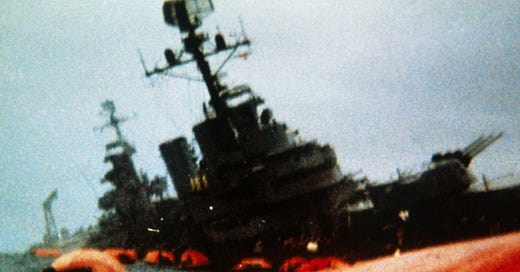The sinking of the Belgrano was not a war crime
This controversy has lingered for forty years – it is now time to put it to rest
EVER since that fateful afternoon on 2 May 1982, the sinking of the Belgrano by the British nuclear-powered submarine Conqueror has always been regarded as one of the most controversial events of the Falklands War. Many critics of the action, which resulted in the deaths of 323 Argentinian sailors, see the sinking as nothing less than a war crime, an unjustified act of butchery.
These critics – who included the late Labour MP Sir Tam Dalyell and the late Ministry of Defence civil servant Clive Ponting – argue that the Belgrano represented no threat to the British task force, and was actually sailing away from the 200-mile Total Exclusion Zone declared around the Falkland Islands.
In their eyes, the action was a disgraceful act of provocation by Margaret Thatcher that was designed to escalate the conflict, and they see the Belgrano as a dark chapter in Britain’s glorious naval past.
With the approaching fortieth anniversary of the sinking – and the recent ‘mysterious’ sinking of the Russian cruiser the Moskva – it now feels like an appropriate time to assess whether the sinking of the Argentinian warship was indeed a war crime.
Most of the discussion about the Belgrano centres on whether the ship was sailing to or from the Exclusion Zone. Much is made of this by those on both sides of the argument – and even those who defend the sinking.
Among them is Sir John Nott, the then Defence Secretary, who has observed: “I remain astonished […] that anyone should consider the momentary compass bearing of Belgrano’s passage to be of any consequence whatever. Any ship can turn in an instant.”
In addition, the publication of the book The Silent Listener by Major David Thorp in 2011, reveals how in 1984 he was ordered to carry out an investigation into the circumstances of the sinking.
Given access to every document related to the Belgrano, Thorp, a member of a highly secret signals-intercept unit during the Falklands War, found an Argentinian signal intercepted by the British in which the Belgrano was ordered to rendezvous with other Argentinian warships at a location east of the islands, and – crucially – well inside the Exclusion Zone.
For the pro-sinking lobby, this is a slam-dunk. However, for the anti-sinking lobby, the unassailable fact remains that at the time she was torpedoed, the Belgrano was outside the Exclusion Zone, so whatever direction she was heading and no matter what orders she had received, her sinking was a war crime.
In fact, the position and direction of the Belgrano and the existence of Exclusion Zone are both completely irrelevant, and have muddied the waters of this debate for the past four decades.
What is often ignored is that Argentina was warned by Britain on 23 April – well over a week before the sinking – that any of its vessels or aircraft would be considered ‘fair game’, whether they were inside the Exclusion Zone or not. This warning was even transmitted to the United Nations on 24 April.
Mrs Thatcher reminded the House of Commons about this warning two days after the sinking, but critics of the action completely ignored it, and defenders of the action were often drawn into arguing about the position and direction of the Belgrano.
It is worth reproducing the exact text of the warning, as it is unambiguous and left the Argentinians in no doubt.
What is clear is that the British only needed to consider whether the Belgrano amounted to a ‘threat to interfere with the mission of the British forces’ – which indeed it was – and could therefore be met with the euphemistic ‘appropriate response’.
Those who claim that the Belgrano was not a threat would do well to listen to two Argentinian naval officers who knew what they were talking about.
The first is none other than the captain of the Belgrano, Héctor Bonzo, who stated in an interview twenty-five years after the sinking: “It was absolutely not a war crime. It was an act of war, lamentably legal.”
His words are amplified by an even more senior naval figure, Admiral Enrique Molina Pico, who wrote in a letter to the Argentinian newspaper La Nación in May 2005 that the location of the Belgrano outside the Exclusion Zone ‘did not mean that it was withdrawn from the war’.
“The integrated naval force had been deployed to carry out an attack on the British fleet in a coordinated operation with other naval groups,” he wrote. “The heading away from the enemy fleet was only momentary, as the Admiral commander saw fit to wait for a more convenient time. The Belgrano and the other ships were a threat and a danger to the British.”
With the Argentinians themselves stating that the action was not a war crime, it is time this controversy should be put to rest. What is more appropriate on the fortieth anniversary of the sinking is that the 323 men who lost their lives should be remembered, and acknowledged that they were the victims of war, and not a war crime.





Good piece.
Great article Guy. It should also be remembered that the exclusion zone was put in place for all neutral vessels as a safety measure. It has no relevance to belligerents.